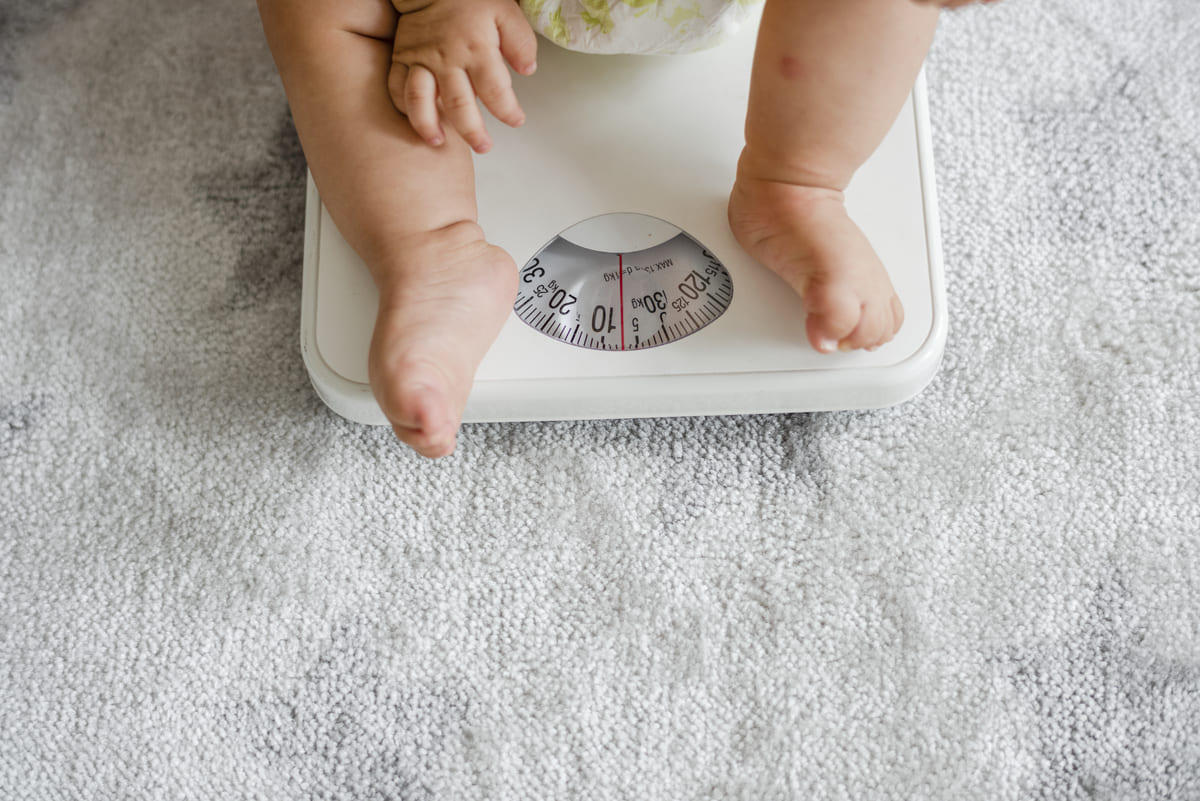Gaining weight is an important part of growing up for babies. A healthy weight gain will ensure that your baby is getting all the nutrients they need to grow and develop properly. It is medically reviewed by pediatricians that exclusively breastfed babies should gain about 5-7 ounces per week from birth to 3 months old.
Though to gain weight for your baby, you need to be very careful about the foods and drinks you give him/her. In pregnancy, for you and your baby’s safety, you were probably told to eat a balanced and nutritious diet. The same applies when you’re trying to help your baby gain weight. As we said there are many ways to ensure your baby gain weight safely and healthily. So, just for you, in this blog post, we have discussed some effective ways to gain weight for your baby.
In This Article
- 9 Effective Ways to increase your baby’s weight
- 1. Healthy and Balanced Diet
- 2. Breastfeed More Often
- 3. Add More Formula
- 4. Focus on Mealtime schedules
- 5. Consider changing formula
- 6. Take proper rest
- 7. Go with medical advice
- 8. Prenatal Vitamins
- 9. Stay Hydrated
- What should a mother eat to increase baby weight?
9 Effective Ways to increase your baby’s weight
If your child is getting enough nutrients and if they’re developing properly, they’re likely growing at a healthy rate. There are many reasons why a child may be underweight. It could be due to a medical condition, such as celiac disease or cystic fibrosis. Or, it might be due to poor nutrition or a lack of access to nutritious food. If you’re concerned about your child’s weight, talk to your doctor. They can help you determine if there’s a medical reason for their low weight and develop a plan to help them gain weight safely. Meanwhile, below are some effective ways to help increase your child weight:

1. Healthy and Balanced Diet
If you want your baby to gain weight healthily, then you need to focus on providing them with a nutritious diet. This means including plenty of whole foods in their diets such as fruits, vegetables, whole grains, and lean protein sources. You should also limit processed foods and sugary drinks. Instead, opt for healthy snacks like nuts and seeds, yogurt, or fruits. If your baby is not gaining weight as per the doctor’s recommendations, then you may need to incorporate more calories into their diet. This can be done by adding healthy fats to their meals such as avocado, olive oil, etc. It is medically reviewed by pediatricians that a healthy diet have a vital role in a child weight gain.
2. Breastfeed More Often
If you’re breastfeeding, then make sure to breastfeed more often. This will help increase your baby’s calorie intake and promote healthy weight gain. In addition to this, breastfeeding has many other benefits for both mother and child. It can help boost the immune system, reduce the risk of allergies, and promote bonding between mother and child. Moreover, you can also try pumping and storing your breast milk so that you can have more flexibility with breastfeeding. Furthermore, in the case of formula-fed babies, you can ask your doctor about switching to a higher-calorie formula.
3. Add More Formula
If you’re feeding your baby formula, then you may need to add more of it to their diet. This will help increase their calorie intake and promote healthy weight gain. Always talk to your doctor before making any changes to your baby’s formula. They can help you determine the right amount of formula for your baby based on their individual needs. In case of the solid food-fed babies, you may need to add more solid foods to their diet. Try adding mashed fruits, pureed vegetables, or cooked grains to their meals. Furthermore, you can also try giving them high-calorie snacks such as cheese, peanut butter, etc. Additionally, a variety of foods should be introduced to babies so that they get used to different tastes and textures.
4. Focus on Mealtime schedules
If you are trying to increase your baby’s weight, then it’s important to avoid skipping meals. Mealtime schedules should be followed as per the doctor’s recommendations. This will help ensure that your baby is getting enough calories throughout the day. In addition to this, you should also avoid letting your baby go too long without eating. This can lead to them becoming ravenous and overeating, which can be harmful to their health. Make sure to have regular snacks and meals available for your baby throughout the day.
5. Consider changing formula
If you’re formula-feeding your baby and not seeing the results you want, then it may be time to consider changing the formula. There are many different types of formulas available on the market, so talk to your doctor about which one may be right for your baby. They can help you choose a formula that will provide your baby with the nutrients they need to gain weight healthily. Furthermore, they can also advise you on how to transition your baby to the new formula. As a parent, it’s your responsibility to focus on your baby’s health and ensure that they’re getting the nutrition they need to thrive.
6. Take proper rest
It is often said that sleep is the best medicine. This statement could not be any more true when it comes to babies. Proper rest is essential for a baby’s overall health and development. In addition, it can also help promote weight gain. When babies are tired, they tend to eat more because their bodies are trying to replenish their energy levels. So, make sure to create a bedtime routine for your baby and stick to it as much as possible. This will help them get the sleep they need to grow and develop properly. Additionally, if you want to increase your baby’s weight, then make sure you’re getting enough sleep as well. Being well-rested will allow you to have the energy and patience you need to care for your baby properly.
7. Go with medical advice
If you’re worried about your baby’s weight, then it’s always best to consult with a doctor. They will be able to give you specific advice based on your baby’s individual needs. Moreover, they can also help you create a plan to safely and effectively increase your baby’s weight. Remember, every baby is different, so what works for one may not work for another. Always consult with a medical professional before starting any new weight gain plan.
8. Prenatal Vitamins
Prenatal vitamins are a great way to ensure that your baby is getting all of the nutrients they need to grow and develop properly. These vitamins can also help promote weight gain in babies. Prenatal vitamins are available over-the-counter at most pharmacies. When you’re pregnant, it’s important to take a daily prenatal vitamin to ensure that you’re getting all of the nutrients you and your baby need. Taking prenatal vitamins also helps reduce complications during pregnancy and delivery. If you’re breastfeeding, you can also take prenatal vitamins to help promote weight gain in your baby.
9. Stay Hydrated
Everyone needs to stay hydrated, but it is especially important for babies. Their bodies are made up of mostly water and they need to replenish their supply often. Babies can become dehydrated quickly, so it is important to make sure they are getting enough fluids. The best way to do this is to breastfeed or give them formula milk regularly. You can also give them water, but make sure it is boiled and cooled first. Furthermore, to weight gain for your baby, you should also drink plenty of fluids yourself. This will not only help you to produce more milk but will also keep your energy levels up.
What should a mother eat to increase baby weight?
In pregnancy, a woman should aim to eat a variety of healthy foods to ensure her own health and support the growth and development of her baby. Many factors can affect a baby’s weight, including genetics, mom’s health, and the environment. A mother’s diet is just one small part of the equation, but it can be an important one. Below are some nutritional foods for a mother who wants to help her baby gain weight in a safe and healthy way.

1. Whole Grains
Whole grains are packed with nutrients that support growth and development. They also contain fiber, which can help regulate a baby’s digestion. Include whole-grain bread, pasta, cereals, and rice in your diet. Eating whole grains can also help a mother maintain her energy levels and avoid pregnancy fatigue. Also, after pregnancy when you breastfeed your child it will also help to increase your baby’s weight.
2. Leafy Vegetables
Leafy vegetables, such as spinach and kale, are excellent sources of vitamins and minerals. They also contain fiber, which can help a baby feel full and promote regular digestion. Dark, leafy greens are also packed with folic acid, a nutrient that is essential for brain development. Add leafy greens to your diet by including them in salads, soups, and sandwiches. You can also steam or sauté them as a side dish. Moreover, green vegetables are low in calories and have a high water content, which can help a mother control her weight gain during pregnancy.
3. Yogurt
Yogurt is rich in calcium, which is essential for a developing baby. It also contains protein and other nutrients that can help a baby gain weight. Choose yogurt that is low in sugar and add your fruits or vegetables for sweetness and extra nutritional value. To increase your baby’s weight after birth, eat yogurt as a snack or add it to smoothies. Furthermore, research has shown that yogurt can help reduce the risk of developing obesity later in life.
4. Fish and lean meat
Fish and lean meat are excellent sources of protein, which is necessary for a growing baby. They also contain other nutrients that can help a baby’s development, such as iron and omega-3 fatty acids. When choosing fish, look for options that are low in mercury, such as salmon, herring, and sardines. You can also get lean meat from chicken, turkey, and tofu. Add fish or lean meat to your diet a few times a week.
5. Eggs
Eggs are a nutrient-rich food that can help increase baby weight. They are an excellent source of protein and contain many other nutrients, such as choline, which is important for brain development. Eggs can be cooked in a variety of ways, so they make a versatile and convenient addition to your diet. Generally, when your baby is 6 months old, you can start feeding them 1-2 egg yolks per day. As they get older, you can increase the amount to 3-4 egg yolks per day. In fact, in your pregnancy diet, you should also consume more eggs because the choline in them can help reduce the risk of birth defects.
6. Avocado
Avocados are a good source of healthy fats, which are essential for a baby’s development. They also contain other nutrients, such as fiber, potassium, and vitamins C and E. As well as being a healthy food for babies, avocados are also easy to digest. It is medically reviewed by peditricians that avocado can help to increase baby weight. On the other hand, avocado is not recommended for babies who are allergic to latex. So make sure to talk to your baby’s doctor before giving them avocado.
7. Oatmeal
Oatmeal is a whole grain that contains fiber, protein, and minerals. It can help a baby feel full and promote healthy digestion. Oats are also easy to digest and are unlikely to cause allergies. You can cook oatmeal for breakfast or add it to smoothies and baked goods. After pregnancy, to increase your underweight baby’s weight, include oatmeal in your diet every day. Moreover, make sure that you drink plenty of water, as it will help to improve your baby’s metabolism.
The Conclusion
Therefore, gaining your baby’s weight safely and healthily is very important. You can start by adding some healthy fats to your diet like olive oil, avocados, nut butter, etc. You can also try adding some starchy vegetables like sweet potatoes and squash to his/her diet. But at the same time, you need to be careful not to overfeed your baby and also watch out for any potential health risks. Always remember all babies are different and will reach their optimal weights at different times. If you have any concerns about your baby’s growth or weight, always consult with your pediatrician. If you like our tips then don’t forget to share your experience with us through the comment section below.










![Home Renovation Guide [2025]](/app/uploads/2021/04/design-hacks-1-378x300.jpg)
